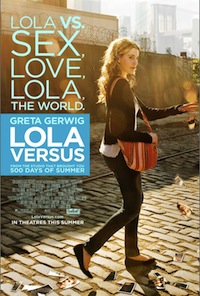 New York City has been the back drop for many a romantic comedy over the years, and why not? It has a population of over 8 million people, which makes it a perfect microcosm to explore the impossibilities of finding that perfect someone. The recognizable urban landscape, the vertical structures become a visual metaphor for the emotional maze that we must travel in our romantic lives.
New York City has been the back drop for many a romantic comedy over the years, and why not? It has a population of over 8 million people, which makes it a perfect microcosm to explore the impossibilities of finding that perfect someone. The recognizable urban landscape, the vertical structures become a visual metaphor for the emotional maze that we must travel in our romantic lives.
From Annie Hall to When Harry Met Sally from Sex in the City to Girls, New York’s dating scene has proven to be a bottomless resource, which can be mined endlessly to varying degrees of success.
If you’ve always been attracted to the allure of the New York rom-com, but have felt they were either too androcentric, overly sentimental, or jejune then you may have a new indie favorite in Lola Versus.
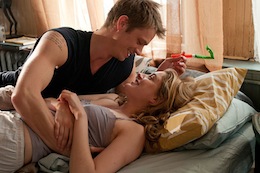 After a long-term relationship ends, Lola (Greta Gerwig) finds herself unexpectedly single. Her ex, Luke (Joel Kinnaman), seems to move on without much difficulty and Lola’s friends, Alice (Zoe Lister Jones) and Henry (Hamish Linklater), try to encourage her to do the same. Lola instead wants to obsess over what has been lost and punishes herself with a series of awkward and even tragic flings.
After a long-term relationship ends, Lola (Greta Gerwig) finds herself unexpectedly single. Her ex, Luke (Joel Kinnaman), seems to move on without much difficulty and Lola’s friends, Alice (Zoe Lister Jones) and Henry (Hamish Linklater), try to encourage her to do the same. Lola instead wants to obsess over what has been lost and punishes herself with a series of awkward and even tragic flings.
From my brief plot synopsis, Lola Versus may sound like a somnambulistic canned rom-com, but co-writer Zoe Lister Jones and director/co-writer Daryl Wein mine the familiar with some very funny and surprising results.
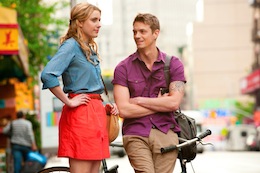 Both Jones and Wein keep the focus directly on the awkwardness of romantic relationships. This is not the glossy world of Sex in the City where anyone can afford expensive shoes, and everyone is hot, ready to have sex and always STD free.
Both Jones and Wein keep the focus directly on the awkwardness of romantic relationships. This is not the glossy world of Sex in the City where anyone can afford expensive shoes, and everyone is hot, ready to have sex and always STD free.
Almost all of the characters are insecure with the choices they are making. From the sometimes-frumpy clothing choices to the desperation of each new relationship that Lola or her friends enter, all are driven by the insecurities of each individual, and come with sometimes stern, often cringe inducing consequences.
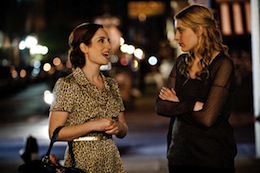 In one funny exchange between Alice and Lola early on, Lola is trying to find a guy for Alice. Lola decides to check on Alice’s dating website profile, and asks her friend if the password is still “I will be your hole.” Alice responds that it’s “I will be your hole 2.” “I will be your hole” was already taken.
In one funny exchange between Alice and Lola early on, Lola is trying to find a guy for Alice. Lola decides to check on Alice’s dating website profile, and asks her friend if the password is still “I will be your hole.” Alice responds that it’s “I will be your hole 2.” “I will be your hole” was already taken.
Alice wants to be the free spirit, multi-partnered, artist partier, and yet someone beats her to the punch on her sexy-ironic password. The tone throughout Lola Versus follows this trend. Lola tries to be strong, but her sensitivity doesn’t allow for the callousness of a one-night stand. Henry is taken with Lola and though he knows there is a laundry list of reasons that he shouldn’t get involved with her, he allows himself to become more and more emotionally entangled. Even Luke fluctuates in whether or not he’s made the right choice in leaving Lola.
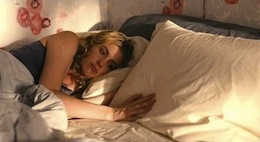
The great thing about the script and the film is that it allows the characters to be ground up by their own choices. There is no clean break or simple outcome. All edges are frayed and ugly, most are also painful and funny.
Oh and let’s talk about sex in movies shall we?
Too often the sex in movies is glossy, beautiful, over long and utterly fake. Characters seemingly pleasure themselves and their partners for days without end, and always with impressive results. It’s all Legends of the Fall, Tristan making sweet sweet love to Susannah. This is not sex that has ever made any sense to me.
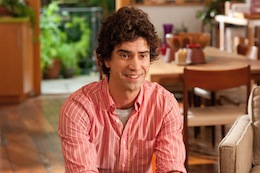 Perhaps Jones and Wein felt the same way, because never is there an unblemished sexual encounter in Lola Versus. They are at best pleasant asides and over quickly. When a character’s sexual encounter does last a few minutes, it is the emotional discomfort that perpetuates the moment not the physical ecstasy. These are sexual encounters that all of us can understand to some extent, because they are rooted in reality instead of the warped fantasy of a romance novel.
Perhaps Jones and Wein felt the same way, because never is there an unblemished sexual encounter in Lola Versus. They are at best pleasant asides and over quickly. When a character’s sexual encounter does last a few minutes, it is the emotional discomfort that perpetuates the moment not the physical ecstasy. These are sexual encounters that all of us can understand to some extent, because they are rooted in reality instead of the warped fantasy of a romance novel.
Lola Versus does have few moments that feel somewhat forced, due in large part to the hands off and observational approach that Wein takes to his framing. Most of the film lives in medium and wide shots, and when a character has an interior moment of emotional breakdown, it places too much weight on the actors’ shoulders to sell the moment.
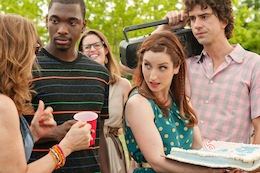
Gerwig and her cast mates offer compelling and understated performances that help rein in the sentimentality that usually permeates the romantic comedy. What we are left with is a funny exploration of relationships and a film that does it’s best to break away from stale formula.
It might make a great date movie as long as it’s not a first date.







Comments on this entry are closed.